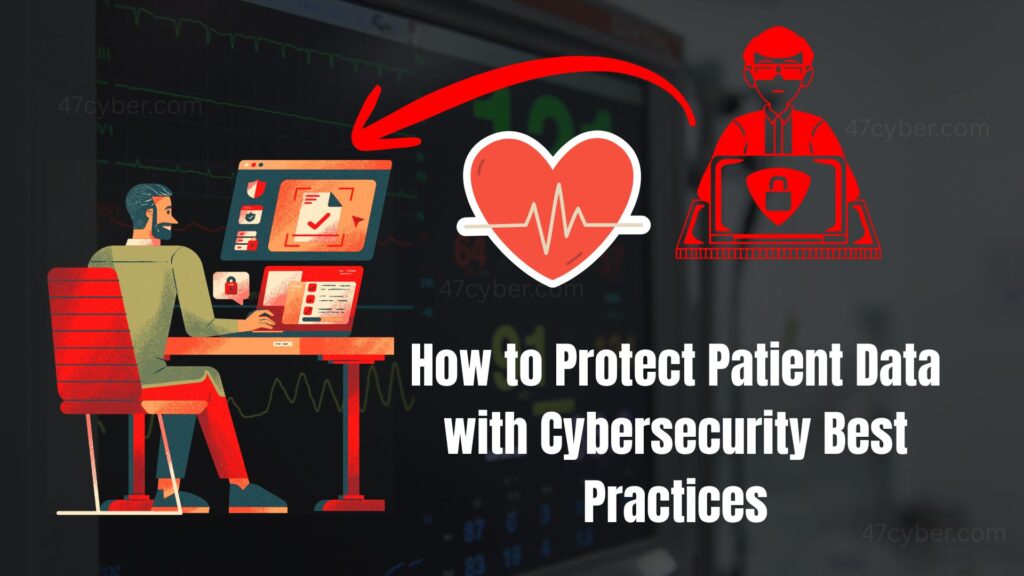Almost every encounter with a patient at a modern clinic nowadays, from signing up to getting lab results, goes through digital technology. Electronic health records (EHRs), telemedicine platforms, and cloud-based healthcare apps have all made it easier to take care of patients. But with ease of use comes a big problem: EHR security – keeping patient data safe from online attacks.

Cybercriminals love to attack healthcare businesses. You can’t just cancel a stolen medical record as you can a credit card number. It usually include a person’s full medical history, insurance information, and Social Security number. This means that protecting healthcare data is not only a legal necessity, but also an issue of patient trust.
In this article, we’ll talk about why it’s important to protect patient data, the most prevalent threats that healthcare organizations face, and the best ways to keep medical information safe while still following HIPAA rules.
Why Healthcare Needs Better Cybersecurity
Cyberattacks in healthcare aren’t only a concern for IT; they can have a direct impact on patient care. Ransomware assaults, for instance, can lock doctors out of systems, put off surgeries, or even stop treatments altogether. Data breaches can hurt a healthcare provider’s reputation and profits by allowing identity theft, fraud, and HIPAA violations to happen.
Recent statistics say that healthcare has been one of the industries most affected by cybercrime because:
- On the underground market, patient information is very valuable.
- A lot of healthcare systems still employ old technology.
- Staff may not know the best ways to keep their computers safe.
Healthcare institutions must make protecting medical records a top priority. It’s no longer a choice.
The best ways to keep healthcare safe from cyber attacks
So, what can hospitals, clinics, and medical offices do to make their defenses stronger? These are the greatest ways to keep patient data safe from hackers:
1. Protect Patient Data Using Encryption
Encryption makes sure that even if hackers get your data, they can’t read it without the right key. All sensitive patient health information (PHI), whether it is housed in databases or sent via email, should be secured. This is true for:
- EHR security, or Electronic Health Records
- Emails with information about patients
- Healthcare apps that run in the cloud
2. Set up strong access controls
Not all staff members need to be able to see all of the patient data. Setting up role-based access control (RBAC) makes ensuring that only people who are allowed to see sensitive information may do so. Adding multi-factor authentication (MFA) makes things even safer by needing more than just a password to get in.
3. Teach your employees about cybersecurity.
One of the main reasons data breaches happen is because people make mistakes. Regular training for doctors, nurses, and administrative staff should include:
- How to spot phishing emails
- Handling patient information safely
- Telling someone about strange behavior
- Knowing the regulations for HIPAA compliance and data security
4. Do risk assessments on a regular basis
Healthcare firms should regularly check their IT systems for weaknesses. A cybersecurity risk assessment in healthcare shows problems that need to be fixed right away, like old software, networks that aren’t secure, or poor authentication mechanisms.
5. Protect Electronic Health Records (EHR security) Systems
EHR Security are the most important part of digital healthcare, but they are also a big target. To keep them safe, you need to:
- Policies for strong passwords
- Updates to the system on a regular basis
- Backup plans in case of ransomware strikes
6. Keep healthcare data on the cloud safe
A lot of hospitals use cloud technologies to make things bigger. Cloud storage is useful, but it might be dangerous if it’s not adequately protected. Only work with cloud providers that follow HIPAA rules, and make sure they have encryption and monitoring tools.
7. Make sure you have a backup and disaster recovery plan.
You can never completely stop cyberattacks, but you can lessen their effects. A strong disaster recovery plan makes sure that healthcare providers can swiftly get patient records back and get back to work without too many problems.
Protecting Patient Data and Following HIPAA
The Health Insurance Portability and Accountability Act (HIPAA) in the U.S. has severe regulations for keeping patient data safe. Not following the rules can lead to big fines and other punishments.
Some important HIPAA cybersecurity regulations are:
- Safe storage and sending of PHI
- Logs of access and audit trails for any data use
- Regular training for employees on how to protect HIPAA data
- Strong physical, administrative, and technical protections
For healthcare providers, staying HIPAA-compliant isn’t only about avoiding fines; it’s also about keeping patients’ trust.
Common Cyber Threats in Health Care
Here are the most common cyber dangers that healthcare firms face to help you understand why these best practices are important:
- Ransomware attacks: Hackers lock up healthcare data and ask for money to get it back.
- Phishing emails are fake emails that deceive people into giving out their login information.
- Insider dangers are when unhappy employees or careless staff let data go out.
- Weak passwords: Simple passwords that are used over and over again make systems easier to break into.
- Unsecured medical devices (IoMT) are connected gadgets like heart monitors or imaging machines that can be hacked.
The first approach to stopping these hazards is to be aware of them.
How healthcare organizations can make their cybersecurity stronger
Here are some things that healthcare companies can do right now:
- Set up a cybersecurity training program for everyone who works there.
- Keep IT systems up to date and fix any problems.
- Make sure to encrypt your data and use safe firewalls.
- Use role-based permissions to limit who can see PHI.
- To stay ahead of new dangers, put money into cybersecurity consulting services for healthcare.
- Use real-life situations to test your disaster recovery plan.
The Future of Cybersecurity in Health Care
As digital health grows, from telemedicine to wearable devices, the necessity to protect patient data will only grow. There may probably be solutions in the future that include:
- Threat detection powered by AI
- Models of security with no trust
- Advanced biometric verification
- Using blockchain to manage healthcare data
Providers in healthcare can keep patient data safe and improve care delivery by adopting new ideas and following best practices for cybersecurity.
In conclusion, Protecting patient data is no longer just something you have to do to be in compliance; it’s an important part of good healthcare. Patients give their doctors their most private information, and any breach can have serious effects on their lives.
Organizations may stay HIPAA-compliant, lower risks, and protect the future of digital healthcare by implementing proven cybersecurity best practices in healthcare, such as encryption, access controls, staff training, and disaster recovery planning.
To put it simply, cybersecurity is keeping patients secure. Protecting patient data today will help build trust and strength in the healthcare systems of the future.



